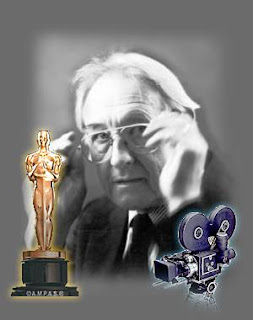 Man of Marble is Andrzej Wajda's controversial attack on the brutality of the Stalinism that held Poland in its thrall during the 1950s
Man of Marble is Andrzej Wajda's controversial attack on the brutality of the Stalinism that held Poland in its thrall during the 1950s This film is about the attempts of a film maker, a woman with the busily self-important manner of the young fanatic, to make a documentary about a certain Mateusz Birkut, a bricklayer who, in the early days of the Communist revolution, was hailed as a national hero for his productivity feats and became as famous as any film star, only to disappear from the record books in 1952.
Agnieszka, played by Krystyna Janda in her first role, is a young filmmaker who is making her diploma film on Birkut, whose whereabouts seems to have been lost two decades later.The title refers to the propagandistic marble statues made in Birkut's image. She gets hold of outtakes and censored footage and interviews the man's friends, ex-wife, and the filmmaker who made him a hero. MAN OF MARBLE - Colour - Polish with English Subtitles - Run Time - 168 Minutes
MAN OF MARBLE - Colour - Polish with English Subtitles - Run Time - 168 Minutes
Wajda managed to publish the script in the

Andrzej Wajda (born March 6, 1926 in Suwałki) is a Polish film director. Laureate of an honorary Oscar, he is one of the most prominent members of the
A major figure of world and Eastern European cinema after World War II, Wajda has made his reputation as a sensitive and uncompromising chronicler of his country's political and social evolution. The son of a Polish cavalry officer who was killed by the Soviets in 1940, Wajda fought in the Home Army against the Germans when he was still a teenager. After the war, he studied to be a painter at Kraków's
On the heels of his apprenticeship to director Aleksander Ford, Wajda was given the opportunity to direct his own film. With A Generation (1955), the first-time director poured out his disillusionment over jingoism, using as his alter ego a young, James Dean-style antihero played by Zbigniew Cybulski.Wajda went on to make two more increasingly accomplished films, which further developed the antiwar theme of A Generation: Kanal (1956) and Ashes and Diamonds (1958), also starring Cybulski.
Wajda was more interested in works of allegory and symbolism, and certain symbols (such as setting fire to a glass of liquor, representing the flame of youthful idealism that was extinguished by the war) recur often in his films Wajda's later devotion to Poland's burgeoning Solidarity movement was manifested in Man of Marble (1976) and Man of Iron (1981), with Solidarity leader Lech Wałęsa appearing as himself in the latter film. The director's involvement in this movement would prompt the Polish government to force Wajda's production company out of business. In 1983 he directed Danton , a film set in 1794 (Year Two) dealing with the Post-Revolutionary Terror. The film carries sharp parallels with the Post-Revolutionary period in
At the 2000 Academy Awards, Wajda was presented with an honorary Oscar for his numerous contributions to cinema; he subsequently donated the award to Kraków's

